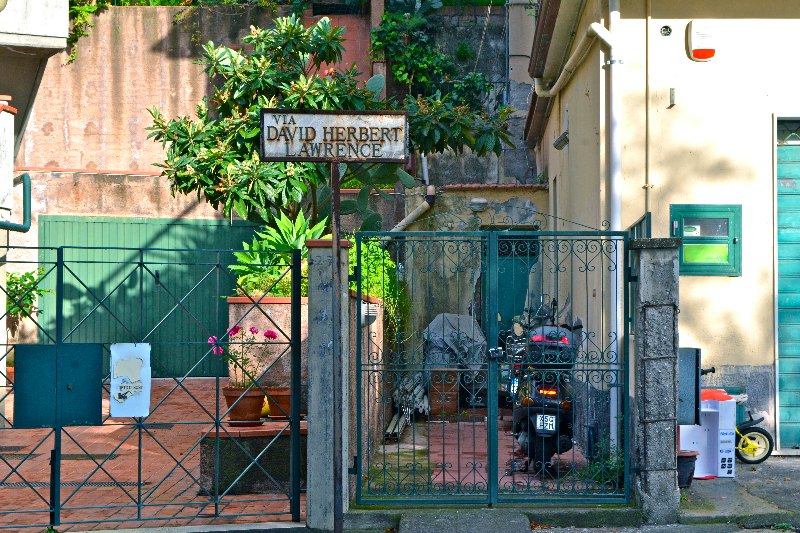Our closer inspection was disappointing; the house looked neither old nor impressive enough, nor did it have a view of the sea or a large terraced garden filled with olive trees as we had read. After all, we had read, too, about how Lawrence would observe the frolics of a local lady with a donkey-driving farm worker in the olive grove terraces below the house...or was that Freida herself? Had this been an inspiration for the character of Constance Chatterley? But, hadn’t we read also, in researching our visit that Lawrence’s villa had indeed been converted in recent times to a small and welcoming bed and breakfast place? Our attempts to arouse a resident by repeated knocking on the door at the B&B entrance and calling out were to no avail; the whole place looked sleepy and shut down in this off-season. We were lost and confused in welter of conflicting and seemingly unanswerable questions.

The B&B
Blissfully unaware, the road wound ahead of us steeply in the growing heat of the day, and we inspected in great expectation a couple of the more substantial free standing houses along the way, especially those on the downhill side of the street but to no avail. Expectantly we would gaze up at the walls half hoping to find a sign or a plaque, like those wonderful blue circular plaques they use in London to denote residences of past famous inhabitants, or the similar historic marker signs used on Paris dwellings, but not a sign was to be seen. No one appeared in the sleepy street whom we might ask for information, not that at this stage we would have expected anyone we had encountered to know or care the first thing about Lawrence or his house, or indeed willing to respond to our questions.
‘I am tired of it’
There was nothing for it but to admit defeat, a defeat particularly frustrating having so readily and tantalizingly found Via Lawrence that had so raised our expectations. Perhaps inevitably and on a philosophical note, as Ruskin has implied, we are doomed to never be able to fully appreciate and satisfy our perception of place, and possess it for ourselves.

Via David Herbert Lawrencr
Thus the tale of our thwarted quest for the Lawrence house in Taormina made more bitter by the subsequent realization that is was there all the time but marked as Capote’s residence. Why did the Tourist office and the map not inform us of Lawrence? I seek some consolation in our feeling in our disappointment an echo of the continual sense of frustration with place that drove the lifelong peripatetic journeys of Lawrence. He was evidently in search of something, ‘his insatiable hunger for meaning’ which to his anger he could never find in the physical world, despite his genius for capturing the fullness of the physical reality of place in the written word ‘instantaneously and without effort’. Clive James sees in this the great pathos of Lawrence’s ‘extraterrestrial un-belonging’.
Lawrence, after 18 months in Taormina came to the conclusion that ‘the Taormina natives are as mean and creeping as ever…..one must have done with Italy…I have been hating Taormina but one hates everywhere in fits and starts”. And with his restless spirit in search of the spiritual he inevitably decided to move on and left in February 1922 for New Mexico via Ceylon and on to Australia where in writing Kangaroo he once again showed his mastery of quickly capturing a spiritual sense of place. Reacting too against the growing fascist mood he wrote as he left Italy: “…the country is sickening …I am tired of it.".
How fleeting too is the local fame of the visiting celebrity even in a town that takes pride in and promotes its artistic and literary heritage. Literary tastes and fashions come and go and it seems that at this juncture, in Sicily at least Lawrence is not a writer in vogue.
What does stay with me despite the disappointment is the spirit of place, of the very beautiful landscape of Sicily, of its difficult history and of its hardy people and of the charms of the old town of Taormina which initially so enchanted Lawrence and Frieda. And as for literary pilgrimages and the quest for places visited and lived in by Lawrence I remain as committed as ever. Such itineraries not only add to an appreciation of his work and character, but also serve to introduce us to wonderful new places, cultures, and experiences, initially through the eyes of Lawrence. My next call may be to visit Eastwood in Nottingham in search of his birthplace and other homes there, or Metz among his first places, or Scandicci or Vence his last places, or…..….
“You need a change of soul rather than a change of climate’ (Seneca)